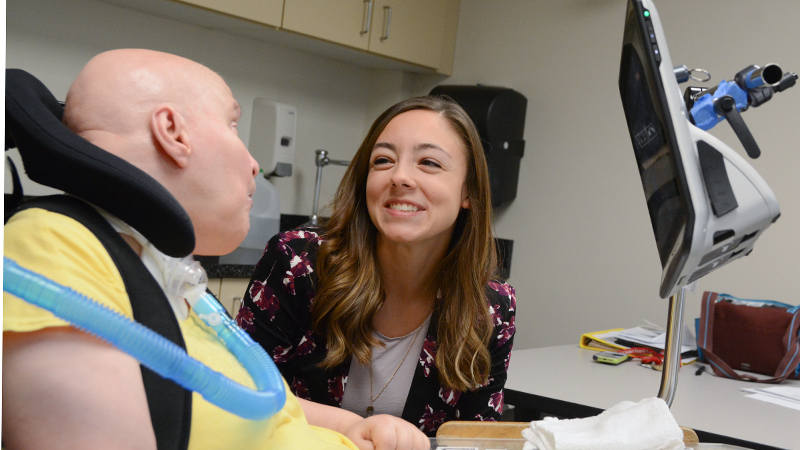Communication Sciences and Disorders
Mission and Goals
Academic Goals
The academic goals of our training program focus on students learning and incorporating evidence-based practice to:
- Describe the biological, neurological, acoustic, psychological, developmental, linguistic and cultural bases of basic human communication and swallowing.
- Explain the major theoretical accounts regarding the typical acquisition and development of speech, language, and hearing, and the relationship of cognitive development to communication acquisition and development and swallowing.
- Describe and explain the characteristics and etiologies of:
- Speech sound production, to encompass articulation, motor planning and execution, phonology, and accent modification
- Fluency and fluency disorders
- Voice and resonance, including respiration and phonation
- Receptive and expressive language
- Hearing, including the impact on speech and language
- Swallowing/feeding
- Cognitive aspects of communication
- Social aspects of communication
- Augmentative and alternative communication modalities
- Describe the principles, materials and methods of assessment for people with communication and swallowing differences and disorders.
- List methods of prevention for communication and swallowing differences and disorders.
- Describe principles and methods of intervention for people with communication and swallowing disorders.
- Explain the processes used in research and the integration of research principles into evidence-based and practice-based clinical practice.
- Explain the certification process, specialty recognition, licensure and professional credentials.
- Describe the standards of ethical conduct.
- Demonstrate oral and written language competency.
Clinical Goals
The clinical goals of the graduate practicum component of our training program, focus on students learning and incorporating evidence-based practice to:
- Evaluate the speech, language, hearing and communication disorders and differences and swallowing disorders of children and adults.
- Identify the factors causing or coexisting with communication problems using appropriate procedures, materials, and instrumentation.
- Prepare and implement evidence-based, and practice-based treatment programs for children and adults.
- Identify and, when possible, prevent the occurrence or development of potential communication and/or feeding/swallowing problems.
- Integrate speech, language, cognitive, and/or swallowing therapy with other necessary services.
- Refer a client for other services when appropriate.
- Use technology in relevant aspects of service delivery.
- Maintain accurate data for the purpose of documenting the short, and long-term effectiveness of intervention approaches and directing future program planning.
- Write diagnostic and therapy reports in a style commensurate with professional standards.
- Educate and counsel clients and their families to effectively manage the communication disorder and/or difference.
The Communication Sciences and Disorders (CSD) Department is committed to intentionally prepare students for the rigor of their careers through education and mentorship as they become competent, ethical, and culturally responsive speech, language and hearing professionals who empower the people they serve.
Personal and Professional Goals
The personal and professional goals of our program focus on students learning to:
- Follow professional, ethical standards.
- Demonstrate problem-solving and decision-making abilities.
- Locate academic and clinical information independently to advance and enhance personal and professional roles.
- Support and value social, cultural and ethnic diversity, equity, inclusion, and belongingness.
- Seek further knowledge and continue educational activities during their professional career.
- Advocate for their clients and the profession.
- Seek further knowledge in interprofessional practices.
